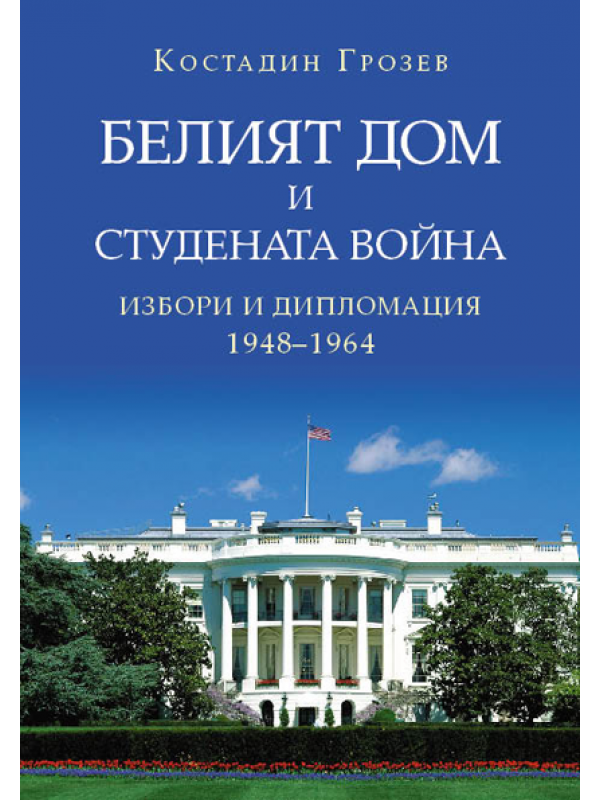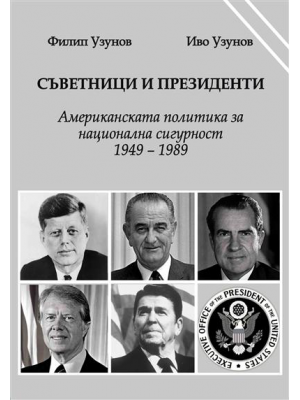Shopping Cart
0 item(s) - 0.00лв
The White House and the Cold War: Elections and Diplomacy (1948–1964)
The White House and the Cold War: Elections and Diplomacy (1948—1964)
Language: Bulgarian with summary in English
The objective on this research has been to reconstruct, analyze, summarize and put into the proper historic context the main foreign policy factors which have had important impact upon the evolutions of the campaigns, candidades’ slogans and the results of U.S. presidential campaigns in the period of the Cold War framed by the years 1948 and 1964.
Table of contents
Forward
Chapter One. 1948: Harry Truman — the President of Containment and Bipartisanship
1. The Legacy of Franklin Roosevelt: Harry Truman and the Democratic Party in Search for Alternatives in 1948
2. The Republican Party: the Clash between Isolationists and Internationalists in Choosing the Party Nomination (up to mid-1948)
3. The Special Session of Congress and the Berlin Crisis — a New Chance for President Truman
4. “Truman Defeats Dewey!”: Foreign Policy Champaign Themes
Chapter Two. 1952: Dwight Eisenhower — the General and the President
1. The Legacy of Harry Truman: Adlai Stevenson, the Cold War and the Bipartisanship on Containing Communism
2. The Republican Party, Overcoming Isolationism and the Search for a Victorious Candidate
3. Stevenson and Eisenhower in the Shadow of Contanment: the Clash between the Liberal Democrat and the Popular Republican General
4. The Korean War, the Final Campaign Appeals and Dwight Eisenhower’s Victory
Chapter Three. 1956: Dwight Eisenhower — the President of Campaign Appeals, Global Changes and International Crises
1. The Legacy of Eisenhower’s First Term: the Challenges of De-Stalinization and Decolonization
2. The Democratic Party and Its 1956 Campaign Appeals: the Challenges of the Nuclear Arms Race and the Suez Crisis
3. The Initial Phase of the Real Presidential Campaign: the Candidates and the Escalation of the Cold War in the Fall of 1956
4. The Second Term and the Trust of Voters in 1956: Appeals and Political Reactions in the Context of Suez, Buda Pest and the Fear of Nuclear War
Chapter Four. 1960: John Kennedy — the New Frontiers and the Cold War
1. The Legacy of Dwight Eisenhower — the Republican Party and the New Challenges of the Cold War
2. The Democratic Party and the Primaries: the Energy of Youth versus the Experience and the Tradition of The Old Guard
3. Nixon versus Kennedy — the Challenges of Khrushchev, Campaign Appeals and T.V. Debates
4. Kennedy’s Victory: Global Confrontation and the Faith of Americans in a Newly-Born Political Myth
Chapter Five. 1964: Lyndon Johnson — the President of Great Society and Conflict in Indo-China
1. The Legacy of John Kennedy: Transition from New Frontiers to Great Society
2. The Republican Party in Search of a President and a New Political Identity
3. L. Johnson versus B. Goldwater: Presidential Campaigning in the Shadow of Great Society and Nuclear Threats
4. The Victory of Great Society
Conclusion
Summary
Белият дом и Студената война. Избори и дипломация 1948–1964
| Details | |
| Publisher | St. Kliment Ohridski University Press |
| Language | Bulgarian with a summary in English |
| Pages | 280 |
| Illustrations | — |
| Binding | paperback |
| ISBN | 978-954-07-3054-7 |
| Creation date | 2012 |
| Size | 16 х 24 cm |
Write a review
Your Name:Your Review: Note: HTML is not translated!
Rating: Bad Good
Enter the code in the box below:











